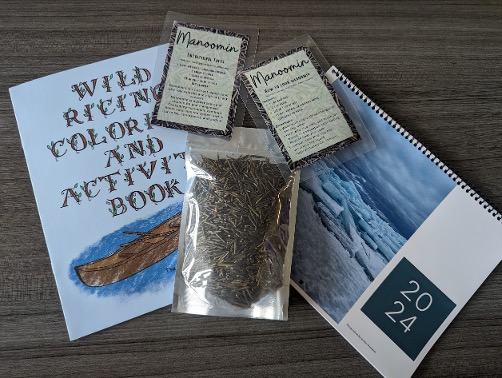Michigan Land Grants work to expand tribal members' access to traditional foods
A pilot project demonstrated the potential for land-grant institutions to come together in service of tribal communities and the clear demand for culturally grounded food access programs

In spring 2024, Michigan’s four land grant institutions worked together to distribute 200 traditional food boxes to members of four tribal communities. An initiative of the Michigan Inter-Tribal Land Grant Extension System (MILES), the effort was a collaboration between Bay Mills Community College, Keweenaw Bay Ojibwa Community College, Saginaw Chippewa Tribal College, and Michigan State University Extension. The pilot project aimed to increase tribal Elders’ and families’ access to nutritious and culturally relevant foods while supporting local and indigenous food producers. MILES partners sent boxes to households from the Little Traverse Bay Bands of Odawa Indians, Keweenaw Bay Indian Community, Bay Mills Indian Community and Saginaw Chippewa Indian Tribe.
Each box contained non-perishable foods sourced from indigenous and/or local producers. Items included wild rice harvested in Wisconsin, maple syrup from the Eastern Upper Peninsula, honey from Bay Mills Waishkey Bay Farm, and ashed corn from indigenous producers in Michigan and Wisconsin. Two tribal colleges provided local beef in their community’s boxes. To promote healthy use of the foods, boxes included educational cards sharing nutritional information and recipes for preparing stovetop wild rice, popcorn, maple glazed salmon and honey lemon tea. As a culturally grounded experience for participants, boxes also contained information on the cultural significance of foods, calendars created by a local artist that included Anishinaabemowin words, a wild rice kids activity book, and Anishinaabemowin translations of food names.

This was truly a collaborative effort, with each partner playing a unique role. Each tribal college sourced, packaged and provided information about a different food. MSU Extension compiled foods and packaged the boxes, supplied nutrition education materials, and sent boxes back to each community for distribution. Each MILES partner worked with a tribal community to give out boxes in ways that worked best for participants. In some locations, the tribal college partnered with the tribe’s Elders services or health center to organize pickup days or bring boxes directly to participants, while at another site MSU Extension mailed boxes to community members. To participate, community members registered online or were individually identified by tribal community partners as demonstrating need. At the Little Traverse Bay Bands of Odawa Indians site, for example, tribal health center nutritionists identified recipients with the most need from their client list.
As a pilot project, this effort produced valuable lessons. The MILES team learned firsthand how supply chain management can be time consuming and complex, and that scaling up the program would require more dedicated resources and a wider network of implementing partners and producers. However, the effort demonstrated the potential for land-grant institutions to come together in service of tribal communities and the clear demand for culturally grounded food access programs. Community recipients shared positive feedback about the experience and enthusiasm for another round of food boxes in the future.
As one tribal college partner stated, “Elders greatly appreciated the effort and the food. Everyone who we talked with about this project thought it was a great idea and look forward to it being expanded in the future.”
Michigan State University Extension, the United States Department of Agriculture Tribal Education Equity & Extension grants and USDA Supplemental Nutrition Assistance Program Education (SNAP-Ed) funded this effort.



 Print
Print Email
Email